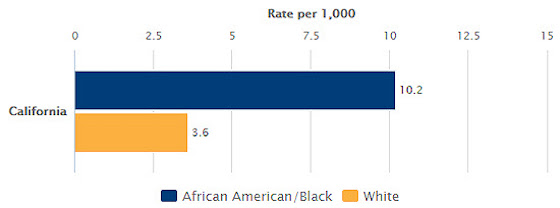 Kidsdata.org, a program of the Lucille Packard Foundation, understands the power of data. Data expose the consequences of racial injustice. But, data do not produce change. It’s you and I who must make the change. We wield data to expose the inequities and stoke the passion for transformation. We draw on data to help us remake policies and institutions to eradicate racist behaviors, practices, and violence.
Kidsdata.org, a program of the Lucille Packard Foundation, understands the power of data. Data expose the consequences of racial injustice. But, data do not produce change. It’s you and I who must make the change. We wield data to expose the inequities and stoke the passion for transformation. We draw on data to help us remake policies and institutions to eradicate racist behaviors, practices, and violence.
Black children, from birth to young adulthood, experience the burden of systemic and institutionalized racism in health care, education, juvenile justice, and other social institutions. In California, persistent disparity has gone on for far too long, and the data continue to show us areas to prioritize in children’s health and well-being.
Infancy
- Black infants are less likely to be born to mothers who had received prenatal care than white infants (79% versus 88%)
- Black mothers who recently gave birth are more likely to report that they had four or more hardships in their youth than white mothers (12% versus 9%)
- Black infants are more likely to die than white infants (10 per 1,000 infants versus 4 per 1,000)
Adolescence and Transition to Adulthood
- Black students are less likely to graduate from high school than white youth (73% versus 87%)
- Black students are less likely to complete college preparatory courses than their white peers (36% versus 52%)
- Black youth ages 10 to 17 are more likely to be arrested than white youth (20 per 1,000 versus 2 per 1,000)
Safety, Violence, and Death
- Black students in 7th, 9th, and 11th grade and non-traditional programs feel more unsafe at school than their white peers (12% versus 6%)
- Black babies and youth ages one to 24 are more likely to die than white youth (59 per 100,000 versus 31 per 100,000)
- The leading cause of death among Black youth ages one to 24 is homicide which is 10 times the rate for white youth (21 per 100,000 versus 2 per 100,000)
Leveraging data and remaking policies and institutions would mean that more Black infants, children, and youth will live, Black children will feel safe, and Black young adults will have opportunity through education to become healthy, economically secure adults. At Kidsdata, we will continue to provide data that expose inequity and bring the most egregious findings to your attention. Please use them to transform our policies and institutions.
We look forward to sharing our next steps in the coming weeks, and we welcome your thoughts and suggestions. Please send your ideas to info@lpfch.org.
